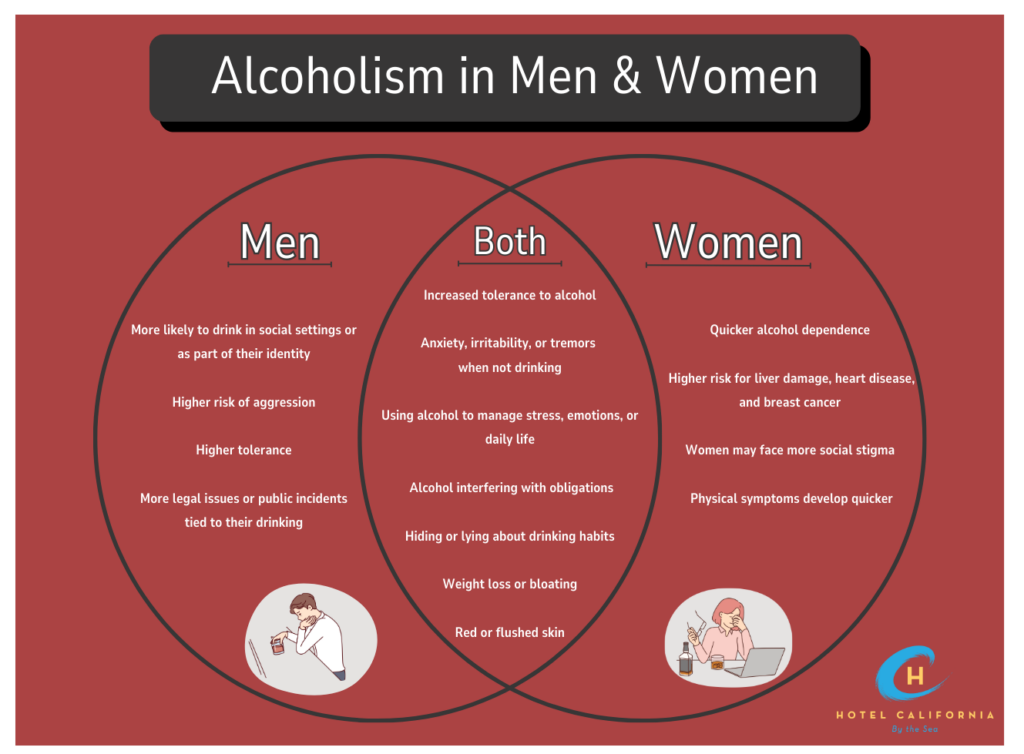Hot to Spot an Alcoholic Female
Alcoholism is a disease that affects anyone and everyone. It does not discriminate. However, it can affect women disproportionately more than it does for men. Recent studies have shown that alcohol misuse among women is steadily increasing. Alcohol-related deaths for women between the ages of 35-54 have doubled in the past recent years. In 2020, 9% of women overall and 17% of women between the ages of 18-25 reported having an alcohol use disorder.

Not only has alcohol misuse among women increased, but studies are also finding that women begin to have alcohol-related issues sooner in life and at a lower drinking amount compared to their male counterparts. In a 2019 study, an estimated 32% of high school female students consumed alcohol compared to an estimated 26% of male high school students. While in general, more college male students are dependent on alcohol, female college students make up more than half of the alcohol abusers among all college students.
Women are also much more susceptible to any negative long-term effects from alcohol misuse. Conditions such as brain damage, risks for cancer and liver damage are significantly heightened in females compared to males. Alcohol affects men and women differently. Even after drinking the same amount of alcohol, women will tend to have a higher blood alcohol concentration level compared to men. The immediate effects of alcohol abuse also occur more quickly in women compared to men. Does this mean women are more easily prone to becoming alcoholics?
Signs and Symptoms: How to spot an Alcoholic Female
- She is drinking more than she planned. It is normal to have and set limits for yourself when drinking. The issues arise when she cannot or is unable to control her drinking behaviors resulting in drinking much more than she intended.
- She is unable to cut down or control alcohol consumption. People who have an alcohol use disorder are much more impulsive and can struggle to decide higher-order executive functions. An alcoholic female will often show signs of impaired decision-making, especially when it comes to drinking.
- Managing her alcohol intake. She will spend an enormous amount of time getting alcohol, consuming alcohol, and recovering from alcohol.
- She will have cravings. Urges and cravings can be a struggle for females with an alcohol addiction. It often leads them to feel restless, empty, anxious and depressed.
- She might have relationship issues. Alcohol use disorder can impair cognitive judgment and things and people that once mattered and were important will probably no longer be a priority. Her drinking will affect everyone around her.
- She will drink regardless of the consequences. If she is an alcoholic, she will drink no matter what the outcome may be. Even if it negatively impacts her overall medical and mental health.
- She will participate in reckless behavior. Drinking often lowers inhibitions and sometimes alcoholics will engage in risky activity such as drinking and driving.
- She will develop a tolerance, dependence and then alcohol addiction.
- She will experience withdrawal symptoms which can include nausea, vomiting, shakiness, weakness, anxiety, insomnia, hallucination, seizures or DT.
- You can find her drinking alcohol in the morning.
There are some physical signs to look for when trying to spot an alcoholic female. Oftentimes, heavy drinkers tend to look much older than they are. She may have a few more wrinkles and look a little more tired. Alcohol misuse can also cause broken capillaries in the facial area. This can create areas of broken veins, redness and inflammation around the face. A red bulbous nose is also a sign of alcohol abuse. Females with drinking problems are also more prone to swelling and the development of cellulite. Keep in mind, that every person is different. These are just general signs to look for in an alcoholic female.

Why are women more sensitive to the effects of Alcohol Abuse?
- Body Fat. Women in general weigh less than men and their bodies contain less water and more fatty tissue. Alcohol is stored and retained in fat, while water dilutes alcohol. Therefore, alcohol can remain at a higher concentration for a longer period of time in a woman’s body in her fatty tissue, which can then expose her brain and other organs to a higher level of alcohol.
- Enzymes. Women have lower levels of an enzyme called alcohol dehydrogenase and aldehyde dehydrogenase. These enzymes help metabolize alcohol in the stomach and liver. This means females are able to absorb more alcohol in their bloodstream compared to their male counterparts.
- Hormones. Changes in hormone levels during the menstrual cycle can also impact how a woman metabolizes alcohol.
Check Your Insurance Coverage for FREE
Find out if your insurance covers addiction treatment in minutes. We accept most insurance!
The impact of Alcohol use Disorder on Women
However, alcohol abuse affects both men and women equally. It tends to have a greater impact on females. Often times women with drinking problems are more likely to blame their issues on depression, anxiety or even family problems. They are less likely to seek out or attend treatment specifically for treating alcohol addiction and are more likely to seek out help through their primary care physician or mental health counselors. This may be due to stigma or it may be because they have a more difficult time accessing these specialty services.
Traditionally, women who need specialty care will also need access to childcare when they are in treatment. Or they may face economic challenges when it comes to taking leave from their job as females often have lower salaries and are offered less flexibility or paid time off. Women are also more likely to suffer from other co-occurring mental health conditions. The combination of these factors stack up against women who are trying to find treatment for their alcohol addiction.
- Alcoholic females can have difficulty with menstruation, premature menopause and fertility
- Alcoholic females are more likely to develop alcohol-induced brain damage
- Alcoholic females are at higher risk of developing liver disease including alcohol-associated hepatitis
- Alcoholic females are at a higher risk of developing breast cancer
- Alcoholic females are at a higher risk of developing alcohol-related heart disease
- Alcoholic females are at high risk for potentially developing dementia
- Alcoholic females with AUD-related conditions are often mistaken for age-related conditions
- Alcoholic females are more susceptible to developing heart disease, high blood pressure and other alcohol-related cardiovascular conditions
- Alcoholic females have an increased risk of osteoporosis
Do you have an Alcohol Use Disorder?
- Are you unable to control how much you drink?
- Are you unable to control when you drink?
- Do you have urges and cravings to drink?
- Have you developed a tolerance to alcohol and need more in order to feel normal?
- Do you drink to feel normal?
- Do you hide your drinking?
- Do you drink alone in secret?
- Do you become agitated or irritable when you cannot drink?
- Do you continue drinking despite the negative consequences?
- Do you prefer drinking over participating in activities you once loved?
- Do you experience blackouts after drinking?
If your answer is yes to only a few of these questions, you may have a problem with alcohol and should consider seeking professional help.
Reach out to Hotel California by the Sea
We specialize in treating addiction and other co-occurring disorders, such as PTSD. Our Admissions specialists are available to walk you through the best options for treating your addiction.
Do you need treatment for Alcohol Use Disorder?
Hotel California by the Sea is a behavioral health treatment program that specializes in the treatment of alcohol use disorder and alcohol abuse. We offer levels of care including alcohol detox, inpatient residential treatment for alcohol addiction, as well as PHP and IOP. In our alcohol treatment program, we provide both medical and behavioral treatment methods including MAT, CBT, DBT and group therapy. The combination of medication management and cognitive therapies can result in a more successful outcome when it comes to overcoming alcohol addiction.
References:
https://www.womensrecovery.com/womens-rehab-blog/24-signs-alcoholism-women
https://www.niaaa.nih.gov/publications/brochures-and-fact-sheets/women-and-alcohol
https://www.cdc.gov/alcohol/fact-sheets/womens-health.htm
https://www.alcoholrehabguide.org/resources/women-alcoholism
https://www.helpguide.org/mental-health/addiction/women-and-alcohol
https://www.healthline.com/health/alcohol-addiction-recognizing-symptoms
